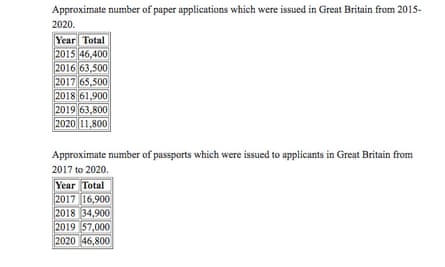The number of Irish passports issued in Great Britain rocketed in the years following the Brexit referendum, according to figures.
The data emerged as it was revealed that the celebrated British author John le Carré went to his grave as an Irish citizen.
Data issued by Ireland’s foreign minister, Simon Coveney, shows just over 422,000 passport applications were made in Great Britain in the years 2016 to 2020.
In the years 2017 to 2020, 358,900 passports were issued, compared with 63,500 in 2016, the year of the poll on the UK’s departure from the EU.
The surge in passport applications was most marked in 2019 when 120,800 were issued by the London embassy, double that of 2016 alone.
The figures do not include numbers for Northern Ireland, where British and Irish citizens born in the region are entitled to dual British and Irish nationality under the Good Friday agreement.
Neale Richmond, a member of parliament (TD), said Ireland was “proud of the global Irish community” and would welcome any new passport-holder to the country.
The figures come after it emerged that Le Carré, one of the UK’s most celebrated spy thriller authors, died an Irishman.
The creator of the quintessential English spy George Smiley was so opposed to Brexit that in order to remain European, and to reflect his heritage, he took Irish citizenship before his death last December aged 89, his son revealed this week.
“He was, by the time he died, an Irish citizen,” Nicholas Cornwell, who writes as Nick Harkaway, says in a BBC Radio 4 documentary due to air on Saturday evening. “On his last birthday I gave him an Irish flag, and so one of the last photographs I have of him is him sitting wrapped in an Irish flag, grinning his head off.”
Le Carré was entitled to Irish citizenship through his maternal grandmother, Olive Wolfe. Under Irish citizenship rules anyone who has or had a grandparent from the country is entitled to a passport once they enter into the foreign birth register.

Anecdotal evidence shows that since Brexit many people of Irish heritage born in Britain have sought to exercise this right to enable them to retain their rights to work, travel and retire anywhere in the EU.
In 2019, Ireland’s Department of Foreign Affairs saidmore than 43,000 British people applied for an Irish passport for the first time.
“The harsh impacts of Brexit and the attack on the rights of so many UK citizens has clearly motivated many to realise their Irish citizenship rights.
“We are proud of the global Irish community and take pride in every passport issued, needless to say if any of our diaspora wish to come home, they’ll be more than welcome,” said Richmond.
Just over 450,000 Irish passports were issued in 2020, according to the government figures, 13% of those through the Irish embassy in Britain.
